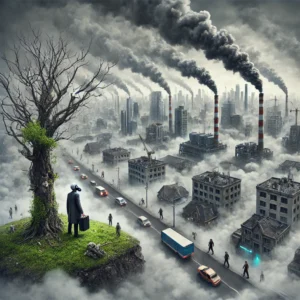Air Pollution: A Global Crisis
 Air Pollution: A Global Crisis
Air Pollution: A Global Crisis
Air pollution is one of the most pressing environmental challenges of our time, impacting human health, ecosystems, and the climate. It arises when harmful substances, such as gases, particulates, and biological molecules, are introduced into Earth’s atmosphere, causing detrimental effects to living organisms and the planet’s natural processes.
Sources of Air Pollution
- Natural Sources:
- Volcanic eruptions release ash and gases like sulfur dioxide.
- Wildfires emit carbon dioxide and particulate matter.
- Dust storms contribute to particulate pollution.
- Human Activities:
- Industrial Emissions: Factories release pollutants like nitrogen oxides, sulfur dioxide, and carbon monoxide.
- Vehicle Exhaust: Combustion of fossil fuels in cars produces smog-forming gases.
- Agricultural Practices: Methane from livestock and ammonia from fertilizers contribute to pollution.
- Deforestation: Reduces the planet’s capacity to absorb CO₂, exacerbating air pollution.
Effects of Air Pollution
- On Human Health:
- Causes respiratory and cardiovascular diseases, including asthma, bronchitis, and heart attacks.
- Linked to premature deaths; the World Health Organization (WHO) estimates millions die annually due to air pollution.
- On the Environment:
- Acid rain damages forests, soils, and aquatic ecosystems.
- Smog and haze reduce visibility, affecting both natural landscapes and urban areas.
- Ozone layer depletion increases UV radiation exposure.
- On the Climate:
- Greenhouse gases, like CO₂ and methane, contribute to global warming.
- Black carbon particles absorb heat, accelerating glacier melt.
Steps to Combat Air Pollution
- Policy Changes:
- Implementing stricter emission standards for industries and vehicles.
- Promoting renewable energy sources over fossil fuels.
- Technological Innovations:
- Adopting electric vehicles (EVs) and cleaner industrial processes.
- Utilizing air purifiers and carbon capture technologies.
- Community and Individual Actions:
- Reducing energy consumption by opting for energy-efficient appliances.
- Using public transportation, cycling, or walking instead of driving.
- Global Cooperation:
- Initiatives like the Paris Agreement aim to reduce carbon emissions globally.
- International collaborations to develop cleaner technologies and share best practices.
Conclusion
Air pollution is not just an environmental issue; it’s a public health and economic crisis requiring immediate action. While governments and organizations have a significant role to play, individual contributions, such as adopting sustainable habits and advocating for cleaner energy solutions, can make a difference. Combating air pollution is a shared responsibility and a crucial step toward ensuring a healthier and more sustainable future for all.







